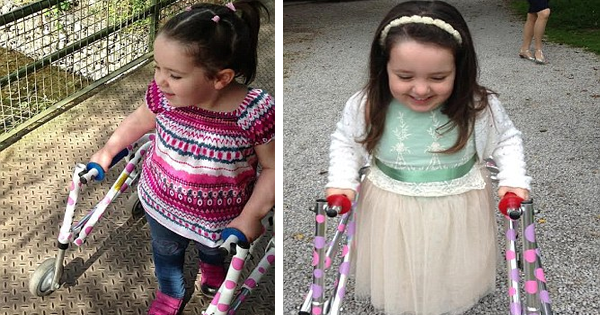Beth Woolford gave birth to her daughter, Freya Bailey, six years ago and has loved and treasured every moment since.
Freya is a bubbly little girl and full of life. Mentally, she was always very active and oftentimes even hit mental developmental milestones ahead of her peers. Physically, growth wasn’t a problem for her either.
At least, not until Freya was just about to turn four years old.
While Freya had originally been nailing almost every developmental milestone, she was suddenly falling behind in terms of her physical growth. “Freya can take a few independent steps and then she will fall over,” Woolford explained.
Anxious for answers, Woolford took her daughter to see the doctor, where the family received the dreadful news.
Freya was diagnosed with diplegic cerebral palsy, a form of cerebral palsy that affects the lower half of the body. The patient suffers from tense muscles and muscle spasms, ultimately causing them to lose much of their potential range of motion.
While diplegic cerebral palsy is considered a “milder” form of cerebral palsy because it doesn’t affect intelligence or cognitive functions as strongly as does cerebral palsy, patients may still have trouble reaching intellectual milestones at the same time as their peers.
For Woolford, this news was devastating.
Her daughter had gone from someone completely normal and eager to learn about the world around her to someone whose world was limited by the number of steps she could take before she inevitably fell over.
According to Woolford, Freya can fall anywhere from 10 to 15 times a day. “Sometimes less or more depending on how tired she is. She has even sprained her ankle from falling before now,” Woolford remembered.
Freya has to concentrate incredibly hard on remaining upright and maintaining her balance. “The slightest thing can make her lose it and fall over,” her mother explained. “It can be something as simple as me calling her name which will distract her, and once she's stopped concentrating on her balance she'll fall over.”
Although Freya is now six and all of her peers at school are independent and running around on their own, she has to rely on the support from a walker, or any other frame that can support her weight. She is also unable to ever dress herself because she can’t balance for long enough due to her condition, and even sometimes suffers from leg spasms.
For a while, Freya was able to combat her disease and learn how to do some things by herself, especially at school. But now, her mother explains, she’s reached a plateau.
“As she gets older, especially with things in school, she is having to have help with things but she wants to be independent,” Woolford said. “She never complains, she just gets on with it and she works really hard. She goes to physio every week and she puts in 110 percent.
“She's made brilliant progress but now it seems to have halted. She gets upset because all her friends are running around and she can't catch up with them.”

There’s nothing else Freya’s doctors can do for her, so they’ve advised Woolford to look into alternative treatment methods – all of which are based out of the country.
In St. Louis, Missouri, in the US, doctors are offering children with diplegic cerebral palsy the opportunity to undergo a life-changing surgery.
During this procedure, surgeons perform a selective dorsal rhizotomy operation, which is explicitly not offered in the UK where Woolford and Freya currently live. But the procedure would sever certain nerves within the body that were impeding muscle motion.
Ultimately, patients would experience an improvement in their muscle stiffness and eventually develop the ability to stand up and walk independently, without falling over so often, if at all.
The main catch?
Woolford, a 29-year-old shop assistant, doesn’t have the money to send her daughter to Missouri to undergo this procedure.
She has since started a fundraiser online, hoping that people around the world will hear her daughter’s story and donate to the cause. All of the money will go toward the medical bills, travel expenses, and housing during Freya’s treatment and recovery.
Any funds that are left over, Woolford promises to donate the Tree of Hope charity that supports poorly children.
Please donate here if you can.





